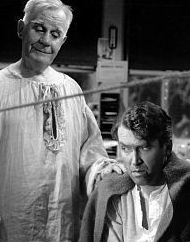Henry Travers
Henry Travers | |
|---|---|
Forest Lawn Memorial Park, Glendale, California | |
| Occupation | Actor |
| Years active | 1894–1949 |
| Spouses | Amy Forrest-Rhodes
(m. 1931; died 1954)Anna (Ann) Glud Murphy
(m. 1955) |
Travers John Heagerty
Early life
Travers was born in Prudhoe, Northumberland, and was the son of Daniel Heagerty,[2] a doctor originally from Ireland, and Ellen Gillman Hornibrook, also a native of Ireland (County Cork). She was previously married to William H. Belcher, a merchant seaman. He died in 1869. Travers had a half-brother, Samuel William Belcher, by his mother's previous marriage. He had a brother, Daniel George Belsaigne Heagerty, and a sister, Mary Sophia Maude Heagerty. Travers grew up in Berwick-upon-Tweed, and many biographies wrongly report him as being born there.[3][4]
The Travers family lived in Prudhoe for a couple of years before moving from Woodburn, on the A68 road near Corsenside, Northumberland, in about 1866, to Tweedmouth, Berwick-upon-Tweed, in about 1876. Initially, he trained as an architect[2] at Berwick, before taking to the stage under the name Henry Travers.
Acting career



Travers gained early experience acting in
His first film was
Travers's best remembered role was as James Stewart's somewhat befuddled but kind-hearted guardian angel Clarence Odbody in Frank Capra's 1946 film It's a Wonderful Life. Travers plays the guardian angel who saves Stewart's from committing suicide, and then shows him how wonderful his life really is. Though the film was a financial flop, it later became a Christmas perennial.
Travers retired in 1949 after his supporting role in The Girl From Jones Beach. Overall, he acted in 52 films.
Personal life and death
Travers' first wife was actress Amy Forrest-Rhodes. They were married from 1931 until her death in 1954. In 1955, he married Ann G. Murphy, who survived him.[2]
After several years in retirement, Travers died as a result of arteriosclerosis in 1965, at the age of 91. He is interred with his second wife in Forest Lawn Memorial Park in Glendale, California.[citation needed]
The Maltings Theatre in Berwick-upon-Tweed has a performance space, The Henry Travers Studio, named after him.[10]
Filmography
- Reunion in Vienna (1933) as Father Krug
- Another Language (1933) as Pop Hallan
- My Weakness (1933) as Ellery Gregory
- The Invisible Man (1933) as Dr. Cranley
- Death Takes a Holiday (1934) as Baron Cesarea
- Born to Be Bad (1934) as Fuzzy
- The Party's Over (1934) as Theodore
- Ready for Love(1934) as Judge Pickett
- Maybe It's Love (1935) as Mr. Halevy
- After Office Hours (1935) as Cap
- Captain Hurricane (1935) as Capt. Ben
- Four Hours to Kill! (1935) as Mac Mason
- Escapade (1935) as Concierge
- Pursuit (1935) as Thomas 'Tom' Reynolds
- Seven Keys to Baldpate (1935) as Adalbert 'Lem' Peters / The Hermit
- Too Many Parents (1936) as Wilkins
- The Sisters (1938) as Ned Elliott
- You Can't Get Away with Murder (1939) as Pop
- Dodge City (1939) as Dr. Irving
- Dark Victory (1939) as Dr. Parsons
- On Borrowed Time (1939) as Dr. Evans
- Stanley and Livingstone (1939) as John Kingsley
- The Rains Came (1939) as Rev. Homer Smiley
- Remember? (1939) as Judge Milliken
- Primrose Path (1940) as Gramp
- Edison, the Man (1940) as Ben Els
- Anne of Windy Poplars (1940) as Matey
- Wyoming (1940) as Sheriff
- High Sierra (1941) as Pa
- A Girl, a Guy and a Gob (1941) as Abel Martin
- The Bad Man (1941) as Mr. Hardy
- I'll Wait for You (1941) as Mr. Miller
- Ball of Fire (1941) as Prof. Jerome
- Mrs. Miniver (1942) as Mr. Ballard
- Pierre of the Plains (1942) as Percival Wellsby
- Random Harvest (1942) as Dr. Sims
- Shadow of a Doubt (1943) as Joseph Newton
- The Moon Is Down (1943) as Mayor Orden
- Madame Curie (1943) as Eugene Curie
- None Shall Escape (1944) as Father Warecki
- Dragon Seed (1944) as Third Cousin
- The Very Thought of You (1944) as Pop Wheeler
- Thrill of a Romance (1945) as Hobart Glenn
- The Naughty Nineties (1945) as Capt. Sam Jackson
- The Bells of St. Mary's (1945) as Horace P. Bogardus
- Gallant Journey (1946) as Thomas Logan
- The Yearling(1946) as Mr. Boyles
- It's a Wonderful Life (1946) as guardian angel Clarence Odbody
- The Flame (1947) as Dr. Mitchell
- Beyond Glory (1948) as Pop Dewing
- The Accused (1949) as Blakely, Romley's Assistant (uncredited)
- The Girl From Jones Beach (1949) as Judge Bullfinch (final film role)
References
- ISBN 978-0-7864-5763-2. Retrieved 20 July 2019.
- ^ ISBN 978-1-4809-4499-2. Retrieved 20 July 2019.
- ^ GRO Register of Births, Marriages and Death and 1881 Census for England & Wales
- ^ Armstrong, Jeremy (27 December 2015). "Did you know one of the most famous Christmas angels was born in Prudhoe?". Evening Chronicle. Newcastle Upon Tyne. Retrieved 17 January 2017.
- ^ ISBN 978-1-5578-3551-2. Retrieved 20 July 2019.
- Newspapers.com.
- ^ "Movie Reviews". The New York Times. 18 July 2019.[dead link]
- ^ "("Henry Travers" search results)". Internet Broadway Database. Archived from the original on 20 July 2019. Retrieved 20 July 2019.
- ^ Review:Androcles. The New Yorker, 5 December 1925. p 14.
- ^ "Our Venues". The Maltings. Retrieved 7 December 2021.
External links
- Henry Travers at IMDb
- Henry Travers on television
- Henry Travers at the Internet Broadway Database
- Henry Travers at Find a Grave
